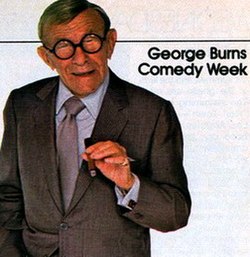This article uses a non-standard episode table. |
| George Burns Comedy Week | |
|---|---|
 | |
| Presented by | George Burns |
| Country of origin | United States |
| No. of seasons | 1 |
| No. of episodes | 13 |
| Production | |
| Executive producers | |
| Running time | 30 min. |
| Production companies | |
| Original release | |
| Network | CBS |
| Release | September 18 – December 25, 1985 |
George Burns Comedy Week is a comedy anthology television series broadcast in the United States by CBS as part of its 1985 fall lineup, hosted by George Burns.